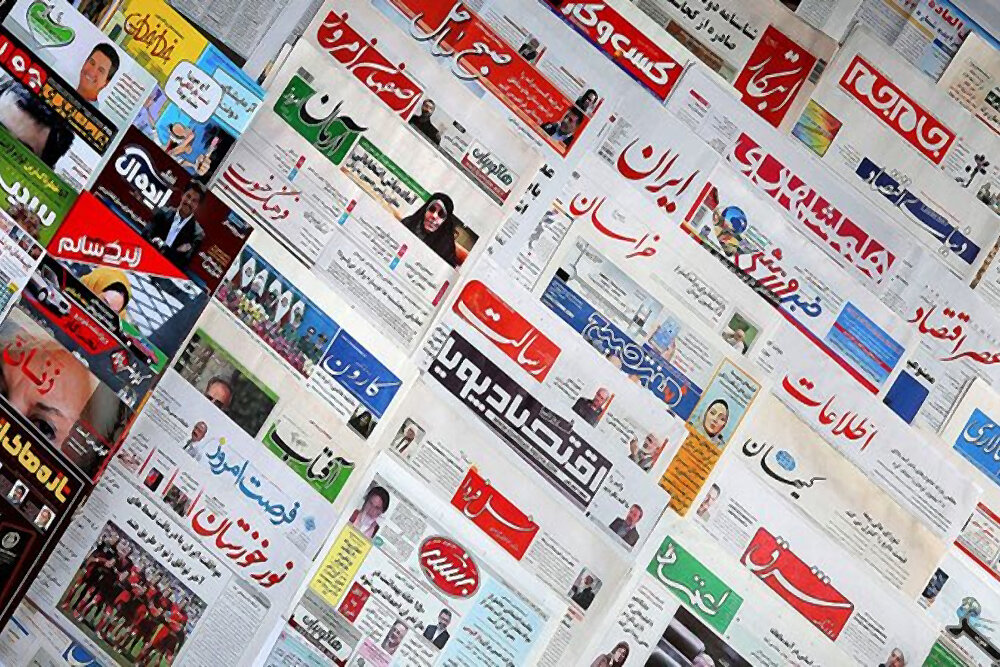TEHRAN PAPERS

The conservative Kayhan newspaper described the ever-rising price of foreign currency as a big bubble that on the verge of bursting at every moment, calling on the people to resist purchasing foreign currency otherwise they will face a huge loss.
The newspaper highlighted that the foreign currency reserves of the country are in favorable condition, quoting the officials. It warned that prices may collapse.
Statistics has shown that the foreign currency price and the stock market have been associated with a significant drop after a period of nonsensical upward trend, the publication said, claiming that the real exchange rate is almost half of the current rate.
Referring to riots as one of the main reasons for upward trend in foreign currency prices, the newspaper stated that today economic situation is much better than last year, but the enemy presents it as worse.
Etemad: Project to sideline Iran
The Etemad newspaper argued that a regional project, through a support by France, is underway to reduce the role of Iran in the region. The paper used a quote from Emanuel Macron who has said “We cannot find a solution for the problems of Lebanon, Iraq and Syria” without reducing Iran’s regional influence as the basis of its analysis.
Macron also announced that a meeting was held on the sidelines of the conference on Iraq in Jordan without the presence of Iranian and Turkish officials, in which the projects of gas, water and electricity transfer to Iraq were discussed in order to reduce Baghdad’s dependence on Tehran.
The newspaper considered Macron's recent statements as a new turning point in the regional approach of Western governments. To analyze the issue, it interviewed Sabah Zanganeh, the former representative of Iran in the Organization of Islamic Cooperation (OIC).
“The diplomatic power of our country has become a little weaker in comparison to the past and we have not been able to use the opportunities well to provide a network of regional and international relations.
When we cannot take use economic, media, social, and diplomatic capacities, the opportunity will be provided for people like Mr. Macron to take advantage of the situation and make inappropriate statements.
Emmanuel Macron's statements echo the voices of regional Arab officials who have long accused Iran of creating crises in the region and describe Iran as a destabilizing factor in the region, from Iraq and Syria to Lebanon and Yemen,” Zanganeh said.
Vatan-e Emrooz: Impossible rapprochement between Iran and Germany
Western version of human rights, Berlin’s support for Israel’s policies, and the nuclear issue are the biggest obstacles to a rapprochement between Iran and Germany, Vatan-e Emrooz wrote.
Israel’s security is the most important priority of the German foreign policy in West Asia and North Africa. Germany has long been Israel’s second most important trading partner after the United States.
Germany’s double-standard approach towards human rights in Iran also seems strange because wherever their important interests are at risk, they can ignore human rights, the author remarked, citing incidents in France, Britain, America, Saudi Arabia and Bahrain as some examples.
The Berlin government has always condemned Iran for its advancing nuclear energy program along with Britain and France in their joint statements.
Considering all these factors, the two countries do not seem to reach a reconciliation, the columnist predicted.
Arman-e Melli: Foreign policy needs practical diversity
Iran needs practical diversity in its foreign policy in a way that we should use every opportunity to reduce tension in the international community, Heshmatollah Falahatpisheh, a former parliamentarian, wrote in Arman-e Melli.
“In the current situation, Iran and America seem to have no plans to revive the JCPOA. The European side’s policy is, however, to prevent an intensification of the crisis between Iran and America,” Falahatpisheh argued.
In the end, America will return to the JCPOA, but now is not the time, the author remarked, explaining, the Americans are trying as much as possible to weaken Iran’s bargaining power by abusing the unrest and the pressure on Iran.
Americans want to replace multilateral negotiations with bilateral negotiations, he remarked.
However, Iranians do not enter into such negotiations, he pointed out.
The author, at the end, recommended two solutions: First, the excuses for weakening Iran’s bargaining power must be set aside; and second, Iran should revise its activities in the international arena as “look to the East” did not increase its strategic power.

No comments:
Post a Comment